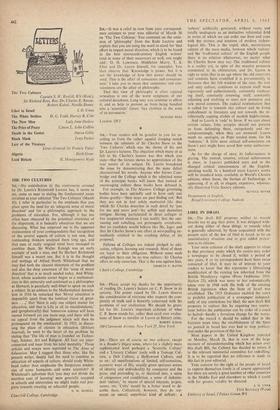The Two Cultures Captain S. W. Roskill, RN (Recd.), Sir
Richard Rees, Rev. Dr. Charles E. Raven, Robert Kahak, Neville Denny
Libel in Israel I. D. Unna
The. White Settlers D. G. Todd, Harvey R. Cole
The New Men Lady June ┬░taloa,
The Price of Peace Canon L. John Collins Death in the Gutter Darsie Gillie Black Mask Tony Parker
Last of the Viceroys
Lieut.-General Sir Francis Tuker Algeria Herb Greer Lord Birkett H. Montgomery Hyde THE TWO CULTURES
SIR,ŌĆöNo contribution to the controversy aroused by Dr. Leavis's Richmond Lecture has, it seems to me, come so near to stating the fundamental issues involved as your editorial 'The Two Cultures' (Mardi 30). I refer in particular to the emphasis that you place upon the need for an 'adequate sense of moral direction' and for a philosophic approach to the problems of education. For, although it has too often been obscured by the polemical overtones of the disputants, it is basically education that we are discussing. What has surprised me is the apparent unawareness of your correspondents that recognition of the several aspects of culture is not new, that outstanding thinkers analysed them long ago, and that men of really original mind have managed to combine them. Sir Walter Raleigh was an early example of such a man, and Sir Herbert Richmond himself was a recent one. But it is in the thought and writings of Alfred North Whitehead that we may find both the clearest statement of the problem and also the deep awareness of the 'sense of moral direction' that is so much needed today. And White- head, whose academic career began as a mathemati- cian in this university and continued as a philosopher at Harvard, is peculiarly well-fitted to speak on such a subject. In an address to the Mathematical Associa- tion in 1916 he remarked that 'Moral education is impossible apart from the habitual vision of great- ness . . .; that 'there is only one subject matter for education, and that is Life in all its manifestations,' and (prophetically) that 'tomorrow science will have moved forward yet one more step, and there will be no appeal from the judgment which will then be pronounced on the uneducated.' In 1923, in discus- sing the place of classics in education (Hibbert Journal), he went to the heart of the problem by stating that 'The life of man is founded on Techno- logy, Science, Art and Religion. All four arc inter- connected and issue from his total mentality.' Those articles and essays were reprinted in The Aims of Education. May I suggest that those who, like the present writer, deeply feel the need to combine in education all aspects of culture, should study White- head rather than emphasise the fissiparous tenden- cies of some humanists and some scientists? If Whitehead's aphorism that 'you may not divide the seamless coat of learning' were generally accepted in schools and universities we might make real pro- gress towards creating an educated people.
S. W. ROSKILL
Churchill College, Cambridge


































 Previous page
Previous page